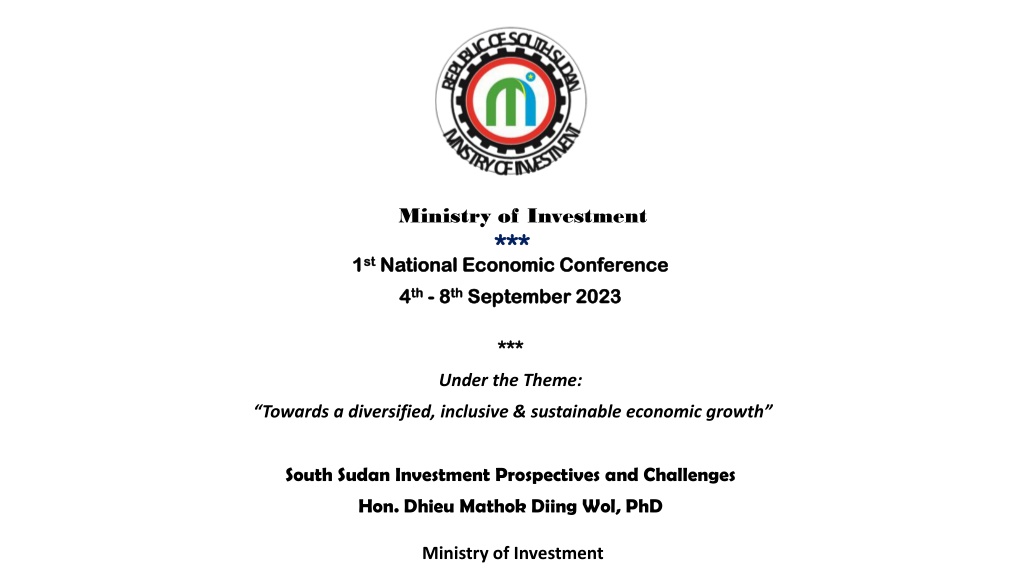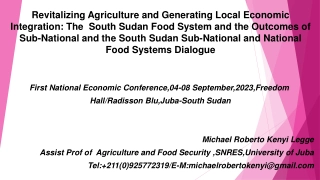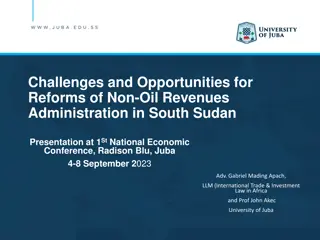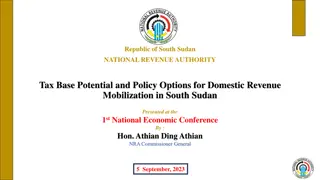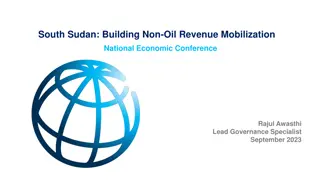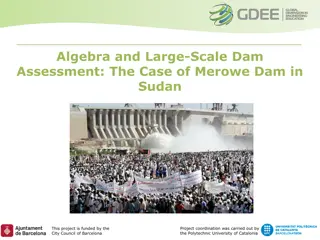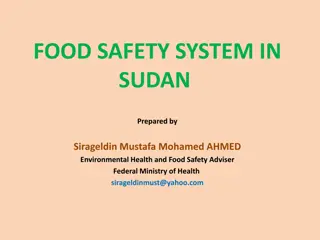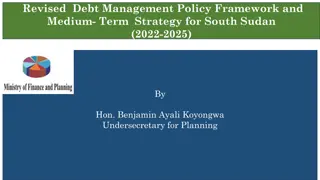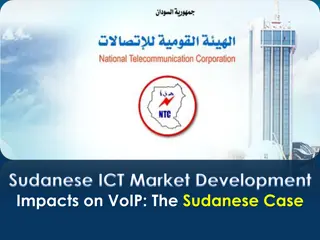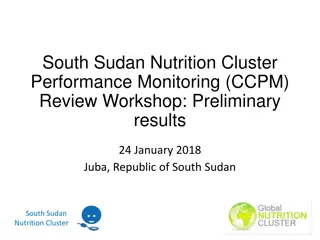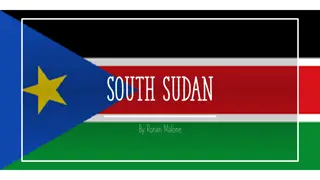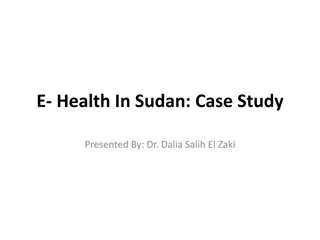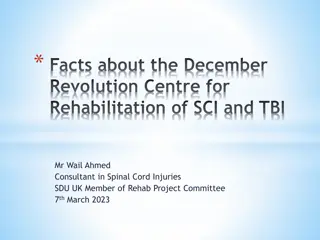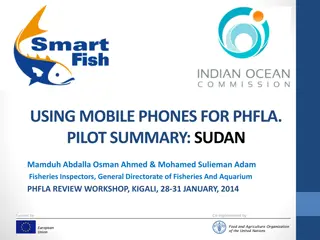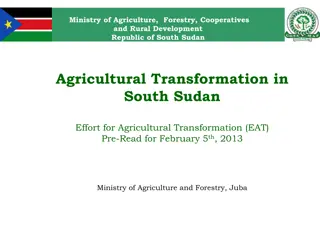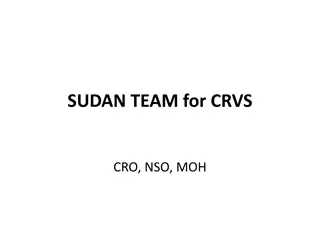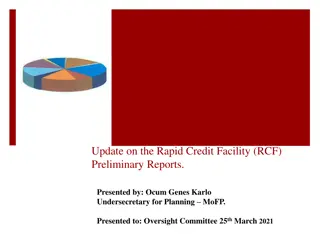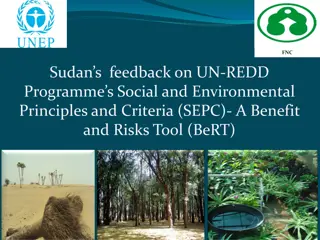Ministry of Investment - Addressing Economic Growth in South Sudan
The Ministry of Investment in South Sudan plays a crucial role in attracting and facilitating both domestic and foreign investments to enhance the country's economic development post-conflict. Established after the Revitalized Agreement in 2018, the ministry focuses on creating a conducive business environment, implementing investment policies, and promoting industrial development. Through various functions and mandates, it aims to drive sustainable economic growth and invite investment opportunities for poverty reduction and infrastructure enhancement.
Uploaded on Sep 23, 2024 | 0 Views
Download Presentation

Please find below an Image/Link to download the presentation.
The content on the website is provided AS IS for your information and personal use only. It may not be sold, licensed, or shared on other websites without obtaining consent from the author. Download presentation by click this link. If you encounter any issues during the download, it is possible that the publisher has removed the file from their server.
E N D
Presentation Transcript
Ministry of Investment *** *** 1 1st stNational Economic Conference National Economic Conference 4 4th September 2023 th- - 8 8th thSeptember 2023 *** *** Under the Theme: Towards a diversified, inclusive & sustainable economic growth South Sudan Investment Prospectives and Challenges Hon. Dhieu Mathok Diing Wol, PhD Ministry of Investment
Introduction On 12th September 2018, the Revitalized Agreement for the Resolution of Conflict in South Sudan (R-ARCSS) restructured the former Transitional Government of National Unity of the Republic of South Sudan. Among others, the Agreement established Ministry of Investment (MoI). The Economic Cluster has expressed its commitment to work closely with all economic stakeholders, including the private sector, civil society, academia, development partners, and other stakeholders to widen and deepen economic reform geared towards accelerating post conflict recovery and building a strong foundation for a private sector driven economy. The Revitalized Transitional Government of National Unity (R-TGoNU) recognizes that the country s weak investment climate continues to constrain both domestic and foreign investment in the country. Among other reforms, improving the quality of business regulation in general and streamlining investment in particular is considered critical to the overall improvement in the quality of investment climate.
Mandate and Functions of the Ministry of Investment: Mandate: The mandate of the Ministry of Investment is to attract and facilitate investors; promote and advocate a conducive business environment for both domestic and foreign investors in the Republic of South Sudan. Functions: The Ministry of Investment shall perform the following functions and duties: a) Encourage and promote domestic and foreign investments in the Republic of South Sudan; b) Develop investment strategies, policies and priorities for the Republic of South Sudan; c) Follow-up and evaluate the execution of the investment policies; d) Execute the investment promotion Act, 2009; the Investment Promotion Regulations, 2012; and any other laws made to promote investments in the Republic of South Sudan; e) Provide facilitation services to investors to register and operate in the Republic of South Sudan;
Cont f) Encourage and facilitate investment for industrial development in the Republic of South Sudan; g) Promote a conducive investment climate in South Sudan, and to simplify and fast track its procedures through One Stop Shop Investment Centre (OSSIC); h) Specify priority strategic and non-strategic investment projects; i) Determine investment services fees; j) Coordinate and prepare the investment Maps at National and State levels; k) Promote investment activities which are geared towards poverty reduction, self-sufficiency and basic infrastructural services in the Republic of South Sudan; l) to Monitor the economic environment to identify impediments to investment and economic growth and propose incentives particularly in priority sectors and areas; m) Promote cooperation between the public and private sectors, donors and states in the formulation and implementation of government policies relating to the economy and investment; n) Collect, collate, and package basic investor information for dissemination to the public about investment opportunities and sources of investment capital, incentives available to investors and the investment climate
The Strategic Focus of the Ministry of Investment The Vision The Republic of South Sudan as an ideal investment destination geared towards wealth creation to improve living standards of its people. The Mission To actively promote South Sudan as a competitive investment destination for Public and Private Sector-led sustainable economic development. The Goal To provide leadership that facilitates investor s services, conducive investment climate and promote investment activities within the regulatory framework.
Cont Core Values: i. Professionalism: the existing skills in the Ministry will be harmonized for effective service delivery. We will continuously asses our training and capacity needs in order to create synergy and build a professional human resource base. ii. Accountability and Transparency: as a Ministry, we will endeavor to be accountable and transparent to the Revitalized Transitional Government of the National Unity (R-TGoNU) and to our stakeholders and uphold high moral integrity in provision of services. iii. Efficiency and responsiveness: we will strive to conduct our function efficiency and serve our clients promptly in a fair manner. iv. Teamwork: in all we do, we will cultivate team spirit, collaboration and consultation for effective service delivery. v. Innovativeness and creativity: as Ministry, we shall be open and proactive in seeking better ways of service delivery.
Investment benefits, incentives and Guarantee: Under the Investment Promotion Act, 2009 (Amendment Bill, 2023) the Investment Certificate entitles the Investors to the following benefits, Incentives, and guarantees : 1. Duty exemption and concessions; 2. Tax exemption on net profits, dividends and capital; Capital allowances; 3. Depreciation allowances; 4. 5. No restriction in repatriation of capital; 6. Guarantees against expropriation and nationalization; 7. Protection of intellectual property rights; 8. Facilitate the grand of land for Investment.
Investment Perspectives Legal and Regulatory Framework The Ministry of Investment has established the One-Stop-Shop (OSS) to facilitate Investors in processing and approval of applications for investment certificate and other relevant permits. Investment promotion Act, 2009 (Amendment Bill, 2023) stipulates the following provisions in the Investment Regime: i. Application and Issuance of investment Certificates ii. Benefits and incentives iii. Investment Guarantees Amendment of Investment Promotion Act, 2009 The Investment Promotion Act, 2009 ( Amendment Bill, 2023) has been drafted and submitted to National Constitutional Amendment Committee (NCAC) through the Ministry of Justice and Constitutional Affairs. The Investment Promotion Regulations, 2012 is awaiting for the approval of the Amendment Bill, for its subsequent amendment. Harmonization of the Investment Promotion Act, 2009 with other relevant Laws The Ministry of Investment in collaboration with the Ministry of Justice and Constitutional Affairs and other relevant stakeholders are to prepare the harmonization of the laws (Companies Act,2012, Land Act, 2009, Taxation Act, 2009, Banking Act, 2012, etc.) National Investment policy The Ministry of Investment in collaboration with relevant stakeholders are to develop a National Investment Policy and make provisions for the establishment of entities such as PPP, the public Investment programs , Micro-Finance Institutions, , Special Economic Zones (SEZ) etc
Achievements of the Ministry of Investment from 2021 to 2022: Investment Policy Framework approved by the Council of Ministers Resolution No. 40/2021 Ministry Organization s Re-structured and staff recruitment was conducted by the Ministry of Public Service and Human resource Development 3 Exhibitions were conducted Launching of E-Service New registration of Investors begins 1st phase of mapping investment resources was conducted in 6 States Public Private Partnership Policy drafted Investment registration and charges/fees collected for the period from January to October 2022. Table No. 1: Number of registered companies Workforce Company Identity Number of S/n National Foreign Total Collection Companies 1. Foreign 120 4437 892 5,329 252,000 USD 2. National 86 659 60 719 3,870,000 SSP 206 5,096 952 6,048
The number of registered Companies by Sectors N/S Sector Number of Companies Area of activity 1 Infrastructure, Education, General Trading, Insurance, Security Services, Hospitality and Hotel, Tourism, Travel Agents, Aviation, Health services, Disaster Management, Warehousing, Oil and Gas, Banking Services, Logistics, Water, Drillings, Telecommunication. Electronics, Engineering, Information Technology, Printing Press, Betting Sport, Mining, and Hardware 469 Services 2 Industrial 5 Beverages, Water 3 Agriculture 1 Farming, seeds, and agricultural equipment
Registered Companies by the Countries of Origin from January 2022 to date Nationality of Company Number of Company S/n South Sudan 98 1. China 32 2. Ethiopia 26 3. Somalia 25 4. Eritrea 23 5. India 18 6. Sudan 16 7. Kenya 14 8. 9. 10. 11. 12. 13. 14. 15. 16. 17. 18. 19. 20. 21. 22. 23. America Lebanon Britain Netherland South Africa Bangladesh Belgium Canada Deutsch Djibouti Israel Pakistan Qatar Serbia Syria Uganda 5 3 2 2 2 1 1 1 1 1 1 1 1 1 1 1
Chart N0 6: Chart N0 6: Investment according to Sectors National: 1. General Trading 2. Service 3. Construction 4. Oil 5. Hotels-Zero Foreign: 1. 2. 3. 4. 5. General Trading Oil Service Contraction Hotel and hospitality
Cont Cont . Chart N0 1: Chart N0 1: Employment Percentages in the Foreign Companies . Foreign employees % = 17% National employees %= 83%
Chart N0 2: Chart N0 2: Employment Percentages in the National Companies 1. Foreign employees % = 8% 2. National employees % = 92%
Chart N0 3: Chart N0 3: Total Percentage of the employment both national and foriegn 1. Foreign Employees: 2. National Employees: 16% 84%
Chart No. 5: Percentage of the Companies not registered both Foreign and National between 2013 Jan,. 2022 Foreign Companies National Companis 31% 69%
Diversifying Economy by investing in the following sectors: A) Agriculture Sector Large production in cereals, oilseeds, Gum Arabic and sugar, etc. 1. 2. and High livestock per capital with huge potential for meat, hides and skins from head of cattle, sheep goats; Commercial opportunities in sustainable fisheries (tilapia, Nile perch, catfish); 3. 4. Tree plantations (Teak, Mahogony, etc,) offering large potential for forestry production and processing; Opportunities for irrigation agriculture schemes. 5. 6. Aweil Rice Project: The Aweil Rice Scheme is a national project established by the Sudanese government in Northern Bahr El Ghazal State, during the British rule in the late 1940 s 7. Nzara Agro-Industrial Complex Project : Feasibility study on revival Nzara Agro-Industrial Complex is completed and available. 8. Yirol Edible Oil Mill: Establish palm oil cultivation and oil factory Melut Sugar Project: develop cane cultivation and sugar production facilities 9. Mongalla Sugar Project: Develop cane cultivation and sugar production 10.
Cont 11. plants, storage facilities, and Fish processing: Develop fish supply chain, including processing refrigerated vans Milk processing: Establish milk processing plants 12. Slaughterhouses: Establish modern abattoirs 13. Poultry farms: Establish modern poultry farms 14. Honey bee products: Establish honey and other bee products processing plants 15. Horticulture: Cold storage and value addition 16.
Cont B) Energy and Mining 1. electric Construct hydro-electric projects. Feasibility studies have already been completed for four (4) large- scale hydro- projects on the Nile, plus an additional 16 mini hydro power sites have already been identified; Develop large- scale solar photovoltaic generation, given South Sudan s access to an average of 10 hours of sunshine per day/ year-round; 2. Opportunities to detailed geological mapping, including airborne geophysical and regional geochemical surveys; 3. Potential to develop broader mining services industry, including tastings labs, data management, and capacity development; 4. 5. Large mining opportunities in major metals around 22 types including zinc, lead, aluminum, precious stones, energy minerals, and industrial materials, etc.; 6. Promising gold prospects - South Sudan s gold is remarkably pure in comparison to the little exploration of mother lode vein deposits of gold being quartz other gold deposits, with upstream from the artisanal deposit; 7. Kapoeta Cement Plant: Complete Feasibility Study for cement plant using local mineral materials; 8. Kapoeta gold exploration, production,smelting and refinery; 9. Hofrat El-Nahass Copper Mine.
Cont C) Tourism and Hospitality Construction of 5 Star hotels and international conference centers in Juba and State Capitals; 1. 2. Cruise Boats and Floating Restaurants on the River Nile; 3. Safari Inns, Camps, airstrips and internal roads in the National Parks: Nimule, Boma etc 4. Birding and fishing operations in the Sudd Wetlands; 5. Wildlife photographic and hunting concessions.
Challenges 1. Poor Infrastructure; electricity, roads etc.. 2. Lack of trust in Sovereign guarantee by foreign investors 3. Insecurity imposed by the holdout groups on the highways and communal violence in some areas; 4. Land acquisition for investment purposes; 5. Outbreak of natural disasters such as floods, droughts and locusts; 4. Companies do not possess operational accounts in South Sudan which created high demand for foreign currency in the country.; 5. Lack of financial support to South Sudanese small and medium size businesses 6. Lack government funding to Ministry of Investment projects 7. Conflicting Regulations/Laws with Investment Act, 2009 e.g. Business Registration Act 2012, Companies Act,2012, Bank Act, 2012 etc.
The Way Forward 1. Revival of defunct projects through Public Private Partnership (PPP); 2. Improve infrastructure network, specially construction of roads connecting areas of production and marketing; 3. Review current Land Policy to include provision of investment land under the custody of the Ministry of Investment; 4. Establishment of early warning systems to encounter outbreak of natural disasters; 5. The government to exsert efforts to bring the holdout groups on negotiation table in order to reach a Peace Agreement. 6. Government to design strategies for a thoroughly disarmament of civilians; 7. Improve National Reserves to back Sovereign Guarantees for investments; 8. Government to prioritize in its national budget funding of productive sectors such as, agriculture, mining, energy and tourism 9. For the implementation of the 1stNational Economic Conference s outcomes, a desk responsible for monstering and evaluation should be created in the office of H.E. Vice President for Economic Cluster
Cont 10. The government to encourage commercial banks and other financial Institutions to ease the process/conditions of acquiring loans for small-businesses for South Sudanese; 11. Create Special Economic Zone (SEZ) in order to facilitate rapid economic growth by leveraging tax incentives to attract foreign investment and spark technological advancement; 12. Government to encourage and support commercial Banks to provide loans for Small and Medium size national Business Community; 13. Government to support Ministry of Investment to conduct general mapping of natural resources in the Republic of South Sudan; 14. As a cross-cutting institution, all government agencies at national and state levels to cooperate with Ministry of Investment in issues related to business activities in the Republic of South Sudan 15. Harmonized Business Laws with Investment Promotion Act 16. For the implementation of the 1stNational Economic Conference s outcomes, a follow-up desk responsible for monstering and evaluation should be created in the office of H.E. Vice President for Economic Cluster.
Conclusion Diversification of the economy in South Sudan requires oil revenues to fuel other sectors such as agriculture, infrastructure energy etc. .
Thank you for your attention
